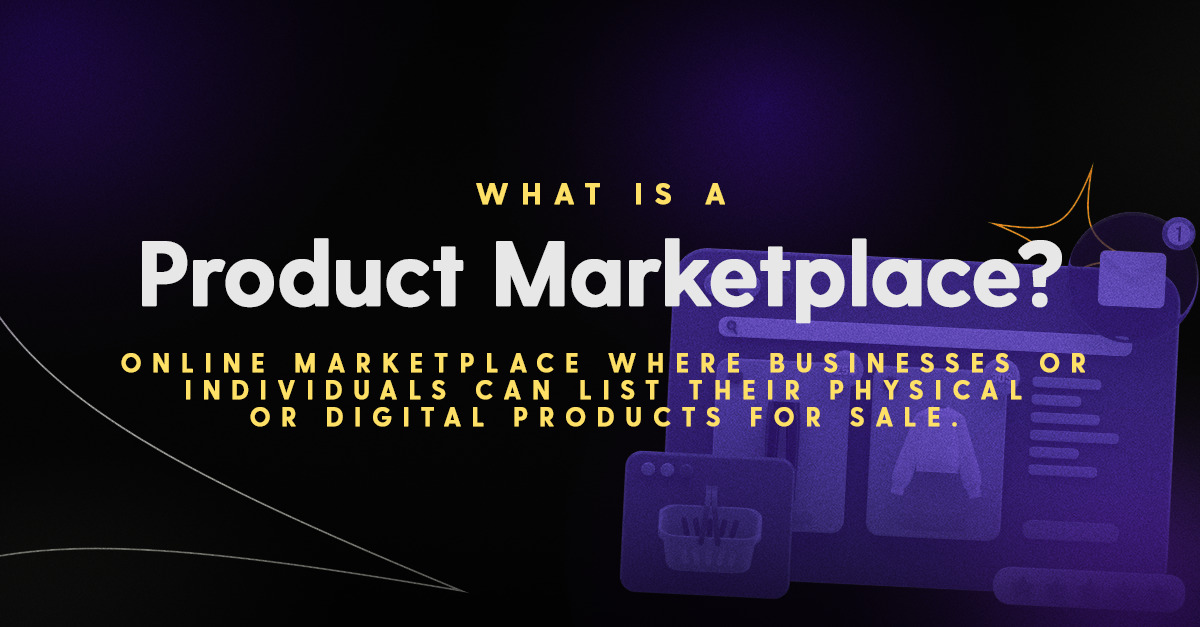Product marketplace definition
A product marketplace is a type of online marketplace where businesses or individuals can list their physical or digital products for sale, and consumers can browse, compare and purchase products.
Product marketplaces, also known as multi-vendor marketplaces, connect vendors (either businesses or individuals) who have products that they want to sell, with consumers who want to purchase those products. The best known examples of product marketplaces include platforms like Amazon, Ebay and Etsy.
A product marketplace differs from traditional ecommerce. While traditional ecommerce platforms have a single operator as the seller, product marketplaces feature multiple sellers uploading their products for sale. This distinction greatly impacts the required platform features and operations.
What are some examples of product marketplaces?
Product marketplaces can cover a wide range of physical and digital goods such as electronics, clothing, audio books, sound clips and so on. Below are some real world examples.
| Product marketplace | Products sold |
|---|---|
| Amazon | Amazon is a vast online marketplace that offers a diverse range of products, both physical and digital. Physical products include electronics, apparel, books and so on. Digital products include Kindle Books, Amazon Music, Amazon Audible and so on. |
| Depop | Depop is a social shopping marketplace where users can buy and sell unique and often vintage clothing and accessories. |
| Etsy | Etsy is an online marketplace where artisans and creators can sell handmade, vintage, and unique items. Products sold on Etsy encompass a wide range, including handmade crafts, vintage clothing and accessories, art, jewellery and home decor. |
| Envato market (including ThemeForest and CodeCanyon) | Envato Market is an online marketplace where creators sell and buyers purchase digital assets such as website themes, templates, graphics, and plugins. |
| iTunes & Google Play | iTunes and Google Play are digital platforms where users can purchase and download digital content, including apps, music, movies, and ebooks, for their respective devices. |
| OpenSea | OpenSea is a marketplace where creators can mint, buy, and sell NFTs (Non-Fungible Tokens), representing unique digital assets, on the Ethereum blockchain. |
Looking to build your own marketplace? We know from experience that it is best to focus on a niche set of products targeted at underserved and/or passionate communities. Read how to come up with a great idea for a marketplace for more information.
What are the essential features for product marketplaces?
There are three main types of marketplace: product, rental and service. Each of these marketplaces has roughly the same core set of features however, because of the distinct nature of the transactions that they facilitate there are significant variations in the required feature sets.
For example, service marketplaces prioritize features like scheduling and task management, rental marketplaces emphasize aspects such as availability calendars and item condition tracking, while product marketplaces focus on inventory management and shipping logistics. These nuanced variations ensure that each type of marketplace caters specifically to the distinct needs of buying, selling, or renting within their respective domains, offering users a tailored and efficient online experience.
Product marketplaces need to have the following features which are distinct from rental and service marketplaces.
Inventory Management: Product marketplaces require tools to efficiently manage and track inventory levels, ensuring accurate product availability.
Shipping and Logistics: Given the tangible nature of products, features for shipping logistics, order tracking, and delivery management become crucial.
Product Reviews: User reviews for products play a vital role in providing insights and influencing purchase decisions, a feature more pertinent to product marketplaces.
Variants and Options: Products often come in various options, sizes, colors, etc., necessitating features to manage and display these product variants.
Wishlist and Favorites: Users may want to save products for future consideration, prompting the need for wishlist and favorites features.
Product Comparison: Tools allowing users to compare different products based on specifications, prices, and features enhance the decision-making process.
Return Policies: Clearly defined return and refund policies are crucial for products, ensuring a transparent and reliable purchasing experience.
Visual Merchandising: Product marketplaces often benefit from features that allow visually appealing displays and arrangements of products for better user engagement.
Learn more about marketplace essential features and how to build a products marketplace 10x faster than traditional coding.
How much does it cost to build a product marketplace?
The cost of building a product marketplace can vary widely based on several factors, including the platform’s complexity, features, design, and the technology used.
Although prices vary, you should expect to spend no less than $50,000 over 6 – 8 months to build a basic product marketplace from scratch. Anything less than this and you’ll either be sacrificing on scope or quality.
To lower the cost and shorten the time to build a product marketplaces, Dittofi has developed a suite of feature rich, open source rental marketplace templates.
Each template is built on a modern, high performance technology stack (React and Google Go) and have carefully designed features that are specific to rental marketplaces. You can take these templates to get a fully functional marketplace in under a day and then customize these features either by directly accessing the code or by using Dittofi’s hybrid no-code platform to rapidly customize the templates without coding.
Learn how to build a product marketplace on Dittofi.
Become a Marketplace Insider
Join our inner circle for exclusive insights, coveted trade secrets, and unparalleled strategies – your journey to marketplace dominance begins here.


